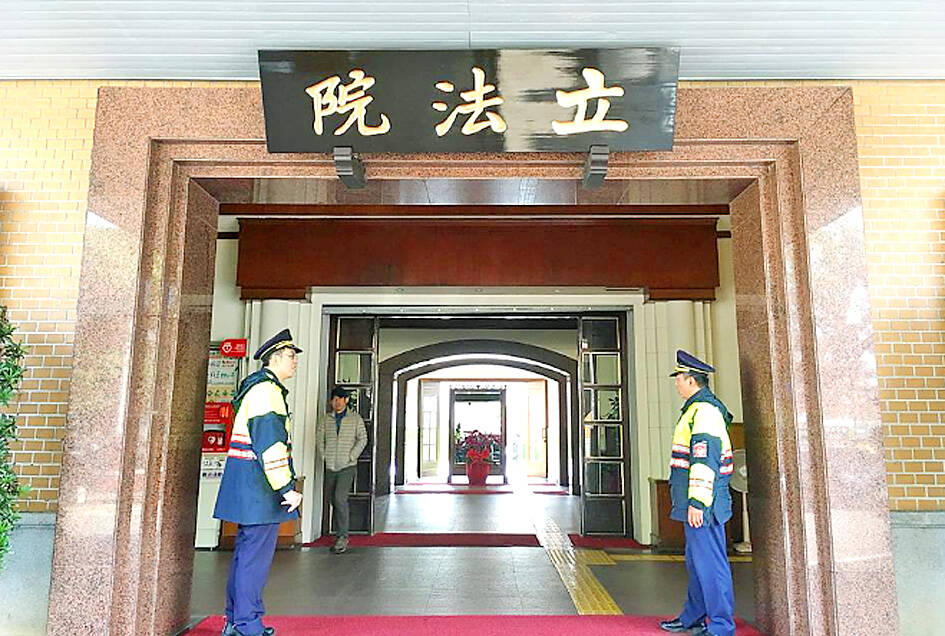Democratic Progressive Party (DPP) lawmakers have proposed an amendment to the National Security Act (國家安全法) that would ensure elected representatives have half the normal sentence added to their term if convicted of leaking state secrets.
Chinese Nationalist Party (KMT) Legislator Ma Wen-chun (馬文君) is under investigation for allegedly leaking confidential material about Taiwan’s Indigenous Defense Submarine Program to South Korea.
Local media reported that during closed-door meetings of the legislature’s Foreign Affairs and National Defense Committee at which details of the submarine program were reviewed, Ma brought in a personal device to call her aides, and refused to sign a confidentiality agreement.

Photo: Lin Liang-sheng, Taipei Times
DPP lawmakers on Thursday last week filed a motion to change the committee’s rules, which was passed.
The amended rules stipulate that no electronic or recording devices, including smart watches and bracelets, legislature-issued communication devices, and cameras, are allowed on lawmakers, officials and staffers attending the committee’s closed-door meetings.
In addition, they cannot keep handwritten notes, must sign a confidentiality agreement and can be searched, the rules state.
However, DPP Legislator Lin Ching-yi (林靜儀) said the new rules do not prevent legislators who hear confidential government or military information from passing it on.
“It is almost impossible to guard against representatives elected by our democratic system who are working for an enemy state,” she said.
Lawmakers have many opportunities to access military files and national secrets, and have the authority to ask government agencies to provide them with confidential material for review, she said.
“Yet when they ... leak national secrets, they receive the same punishment as any member of the public,” Lin said.
Lin and other DPP legislators proposed a supplement to Article 7 of the act and have received the signatures needed to ensure it is discussed by the legislature.
The proposed amendment refers to the definition of public officials in Article 2 of the Civil Servants Election and Recall Act (公職人員選舉罷免法), saying that they should face a punishment proportional to their responsibilities “to ensure our national security is safeguarded.”
The proposed amendment says that those serving in office, or who are retired — whether they are in government or the armed forces — must have half the normal sentence added to their term if convicted under Article 2 of the National Security Act.
Separately, DPP Legislator Lin Tai-hua (林岱樺) had proposed an amendment to the Rules of Procedure of the Legislative Yuan (立法院議事規則), which passed a first reading on Oct. 6.
The proposed amendment requires all legislators, invited government officials and legislature staffers to sign a confidentiality agreement when attending closed-door meetings, or be refused access.

AGING: As of last month, people aged 65 or older accounted for 20.06 percent of the total population and the number of couples who got married fell by 18,685 from 2024 Taiwan has surpassed South Korea as the country least willing to have children, with an annual crude birthrate of 4.62 per 1,000 people, Ministry of the Interior data showed yesterday. The nation was previously ranked the second-lowest country in terms of total fertility rate, or the average number of children a woman has in her lifetime. However, South Korea’s fertility rate began to recover from 2023, with total fertility rate rising from 0.72 and estimated to reach 0.82 to 0.85 by last year, and the crude birthrate projected at 6.7 per 1,000 people. Japan’s crude birthrate was projected to fall below six,

US President Donald Trump in an interview with the New York Times published on Thursday said that “it’s up to” Chinese President Xi Jinping (習近平) what China does on Taiwan, but that he would be “very unhappy” with a change in the “status quo.” “He [Xi] considers it to be a part of China, and that’s up to him what he’s going to be doing, but I’ve expressed to him that I would be very unhappy if he did that, and I don’t think he’ll do that. I hope he doesn’t do that,” Trump said. Trump made the comments in the context

SELF-DEFENSE: Tokyo has accelerated its spending goal and its defense minister said the nation needs to discuss whether it should develop nuclear-powered submarines China is ramping up objections to what it sees as Japan’s desire to acquire nuclear weapons, despite Tokyo’s longstanding renunciation of such arms, deepening another fissure in the two neighbors’ increasingly tense ties. In what appears to be a concerted effort, China’s foreign and defense ministries issued statements on Thursday condemning alleged remilitarism efforts by Tokyo. The remarks came as two of the country’s top think tanks jointly issued a 29-page report framing actions by “right-wing forces” in Japan as posing a “serious threat” to world peace. While that report did not define “right-wing forces,” the Chinese Ministry of Foreign Affairs was

PREPAREDNESS: Given the difficulty of importing ammunition during wartime, the Ministry of National Defense said it would prioritize ‘coproduction’ partnerships A newly formed unit of the Marine Corps tasked with land-based security operations has recently replaced its aging, domestically produced rifles with more advanced, US-made M4A1 rifles, a source said yesterday. The unnamed source familiar with the matter said the First Security Battalion of the Marine Corps’ Air Defense and Base Guard Group has replaced its older T65K2 rifles, which have been in service since the late 1980s, with the newly received M4A1s. The source did not say exactly when the upgrade took place or how many M4A1s were issued to the battalion. The confirmation came after Chinese-language media reported